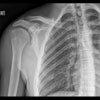
NEW YORK (Reuters Health), Aug 26 - Single-session stereotactic radiotherapy (SR) can be a safe and effective treatment for acromegalic patients with residual or recurrent growth-hormone secreting adenoma, Italian researchers report.
The treatment of choice for most patients with acromegaly is trans-sphenoidal surgery to remove the pituitary tumor, yet approximately 40% of patients will not achieve remission, the report indicates. Those patients not cured by surgery or who experience a recurrence are candidates for treatment with medications or radiotherapy.
Prior research has shown that precise and potent radiation produced with SR can reduce growth hormone levels more rapidly than fractionated radiotherapy, note lead author Dr. Marco Losa and colleagues from Universita Vita-Salute in Milan. Still, data are lacking about the long-term efficacy of SR in acromegalic patients.
The current investigation involved 83 patients who had a residual or recurrent active adenoma after having undergone maximal surgical debulking at the researchers' center. The goal of SR was to achieve normal levels of insulin-like growth factor 1 while keeping basal growth hormone levels below 2.5 µg/L without resorting to growth hormone-suppressing drugs. The median follow-up period was 69 months.
Overall, 50 patients (60.2%) achieved the therapeutic goal, the researchers report. The five-year remission rate was 52.6%, according to the report in the Journal of Clinical Endocrinology and Metabolism for July.
In an additional 13 patients (15.7%) who had been resistant to somatostatin analogs, SR, along with continued analog therapy, achieved disease remission.
On multivariate analysis, low basal levels of growth hormone and insulin-like growth factor were predictive of treatment success.
No serious adverse effects were seen with SR and the five-year cumulative risks of new onset hypogonadism, hypothyroidism, or hypoadrenalism did not exceed 4.9%.
"SR treatment might be considered as an alternative to lifelong treatment with somatostatin analogs or growth hormone receptor antagonists, particularly in patients with small tumor residue located away from the optic pathway and the residual normal pituitary gland," the research team concludes.
J Clin Endocrinol Metab 2008;93:2546-2552.
Last Updated: 2008-08-25 15:32:07 -0400 (Reuters Health)
Related Reading
Stereotactic radiosurgery can extend survival in small recurrent glioblastomas, June 20, 2008
Copyright © 2008 Reuters Limited. All rights reserved. Republication or redistribution of Reuters content, including by framing or similar means, is expressly prohibited without the prior written consent of Reuters. Reuters shall not be liable for any errors or delays in the content, or for any actions taken in reliance thereon. Reuters and the Reuters sphere logo are registered trademarks and trademarks of the Reuters group of companies around the world.


















